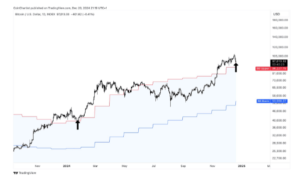

Securing funding for startups has never been a walk in the park, and the current economic volatility has made it even more demanding. According to PitchBook’s 2023 report, capital demand surpasses supply by a daunting 50.5% for early-stage and 67.1% for growth-stage ventures. Startups cannot rely on impressing with just metrics to attract investors. Investors want more; they want to understand the “why” behind a startup’s success, delving into the long-term growth trajectory.
In my capacity as the CEO of Aryng, a data science consulting firm that helps startups and growing enterprises drive success with their data, I recently engaged in an insightful conversation with Cathy Tanimura, VP of Analytics and Data Science at Summit Partners. We discussed the critical role of building and nurturing a robust data culture.
In a time when investors are exercising heightened caution, a strong data culture proves invaluable. When you have a strong data culture, investors are able to gain insight into the “reasons” behind success. They understand how your data team solves problems, optimizes fund allocation, and identifies revenue-driving insights.
A data-focused approach signals a company’s ability to run its business efficiently. As Cathy aptly put it, leaders should “know the drivers of your business, what makes your customers tick, what’s important to your growth, what’s helping or hindering you from growing and then work backward into the data that you need to have the insights about those drivers.”
Cathy went on to add how data culture can help align metrics with goals, manage risks, streamline due diligence, optimize data retrieval, and ensure control and transparency.
Building this culture empowers founders to compellingly articulate their journey to potential investors. It signals a commitment to data-driven decisions over gut instincts, a trait that gives confidence to cautious investors.
As I absorbed Cathy’s perspective, I felt inspired to share my experience-driven strategies on how startups and growing companies can build a robust and adaptive data culture that can help them kickstart this initiative.
Empower data-driven leadership
While the strategies I’m about to share aren’t necessarily a step-by-step sequence, one thing is clear: Data culture starts at the very top.
Every decision that leaders make should carry a precise expectation of its business impact, fitting into broader company goals.
Leadership is the engine that drives a strong data culture in an organization. The core of establishing a thriving data culture in these settings hinges on leaders making decisions grounded in data-driven insights.
In my experience, many startups kick off with decision-making based on hunches. However, as they evolve and grow, depending solely on hunches becomes a limitation. It’s crucial to differentiate between hunches and structured hypotheses. Hunches often rely on intuition without concrete data, whereas hypotheses involve crafting specific statements based on existing data and logic. This transition can set them on a path of rigorous experimentation and data analysis, resulting in more informed, data-driven decisions.
I strongly recommend executives adopt this hypothesis-driven approach. It deepens their understanding of complex cause-and-effect dynamics within their operations, cultivating a culture of data-driven excellence.





